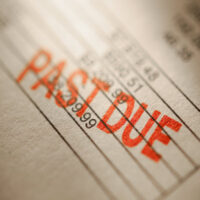If You Have Unpaid Bills During Probate, What Happens To Them?

Sometimes, a person dies with unpaid bills. And, when their estate goes through probate, these unpaid bills must be dealt with.
Going over what happens to unpaid bills during probate, and speaking with a Florida probate lawyer at the Millhorn Elder Law Planning Group, will allow you to obtain the best possible outcome when dealing with them.
What Is Probate?
Probate is a court process that allows your assets to be transferred to your beneficiaries.
To ensure that your assets go to your chosen beneficiaries, all of your assets are identified and then gathered. Right after these assets are identified and gathered, any debts must be paid off and the assets must be distributed.
Just as an example, if you wish to give a house to one of your beneficiaries, then this house will be identified and gathered, any debts on this house will be taken care of, and then it will be given to your beneficiaries.
Who Is Responsible For Paying Unpaid Bills During Probate?
Within the state of Florida, all unpaid bills – those related to repair costs on a house, for example – must be paid off by the estate.
Even though the estate must pay off any unpaid bills, it is important to note that the estate does not need to pay off these unpaid bills until after the probate process has been completed.
What Happens To Unpaid Bills After Probate?
Right after the probate process is complete, there are two potential actions that can, and likely will, occur. And, with that in mind, these potential actions are as follows:
- The assets, within the estate, will be used to pay off the unpaid bills.
- The probate court negotiates payment plans and other, related, arrangements regarding these bills.
Regarding the first item on the list above, if there are significant cash reserves within the estate, then these may be used to pay off some, or all, of the unpaid bills.
Regarding the second item on the list above, if sufficient funds are unavailable, and these bills cannot be paid, then the probate court will often try to negotiate payment plans that allow these bills to be taken care of.
Can Unpaid Bills Be Discharged?
To answer the question outlined above, “Yes, unpaid bills can be discharged.” But, even though unpaid bills can be discharged, this doesn’t necessarily mean that they will be.
Rather, if there are certain unpaid bills that the estate simply cannot take care of – they are too burdensome – then they can be discharged or forgiven completely.
Other times, though, certain unpaid bills cannot be discharged. And, some of the bills that cannot be discharged include student loan bills and credit card bills; neither of those two types of debt can be discharged.
Speak With A Florida Probate Lawyer Today
Going through probate is complex, and discharging unpaid bills, is not easy. Speak with a Florida probate lawyer today and we will assist you in obtaining the best possible outcome regarding your estate.
Sources:
help.flcourts.gov/Other-Resources/Probate
codes.findlaw.com/fl/title-xlii-estates-and-trusts/fl-st-sect-733-707.html


